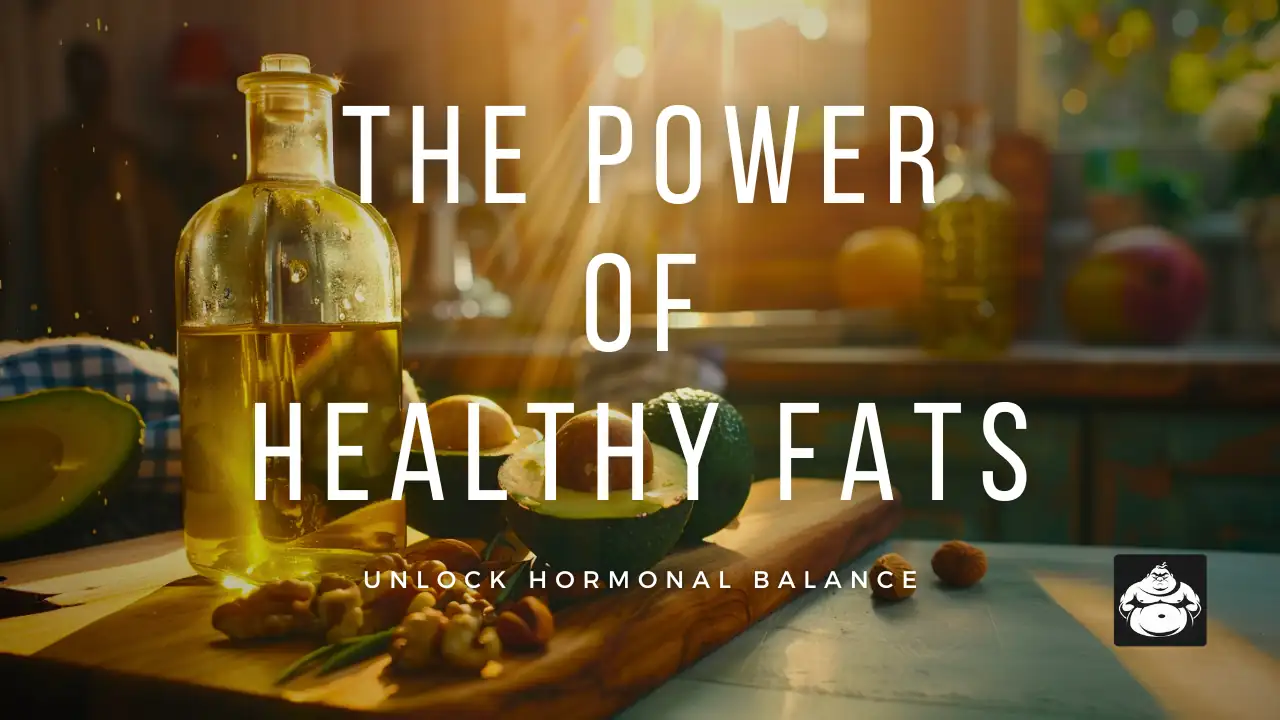The Fat-Hormone Connection: Why Your Diet Matters
By discovering how dietary fats influence hormone production, you may uncover surprising effects on your overall health and well-being.

When it comes to hormone production, you might not realize how vital dietary fats actually are. These fats aren't just about energy; they form the basis for essential hormones like estrogen and testosterone. By understanding the types of fats that promote hormonal balance and their role in nutrient absorption, you can make more informed dietary choices.
But what happens when you don't get enough of the right fats? The implications could be significant, and it's worth exploring further to understand the full impact on your hormonal health.
Dietary Fats: The Foundation of Hormonal Health
Understanding the importance of dietary fats is crucial, as they serve as essential building blocks for hormone production and overall hormonal balance in your body.
A proper dietary fat intake supports the production of critical hormones, like estrogen and testosterone, which are key for reproductive health. Omega-3 fatty acids, in particular, play a significant role in maintaining hormonal balance and improving insulin sensitivity.
These healthy fats help your body absorb fat-soluble vitamins that are essential for hormone synthesis and function. Furthermore, dietary fats influence leptin production, a hormone that regulates appetite and energy.
Understanding Different Dietary Fats and Their Hormonal Impact
When it comes to dietary fats, you need to understand the different types and their effects on your body.
Saturated fats, found in foods like meat and dairy, can impact your cholesterol levels.
On the other hand, monounsaturated and polyunsaturated fats, from sources like olive oil and fish, offer health benefits and support hormone production.
Nevertheless, you should avoid trans fats found in processed foods, as they can harm your health and disrupt hormonal balance.
Saturated Fats: Sources and Their Role in Hormone Production

Saturated fats, often found in animal products like butter and cheese, play an important role in hormone production and overall cellular health.
These fats are critical for the synthesis of important hormones like estrogen and testosterone, which regulate various bodily functions.
You can find saturated fats not just in dairy and red meat but also in plant oils like coconut oil and palm oil.
While past studies raised concerns about saturated fats raising LDL cholesterol, recent research suggests that high-quality sources might offer health benefits when consumed in moderation.
Maintaining a balanced intake of saturated fats is essential for hormonal balance, supporting the production of hormones that help regulate metabolism and reproductive functions.
Unsaturated Fats: Key Players in Hormonal Balance
Unsaturated fats, especially monounsaturated and polyunsaturated types, are essential for hormone production and overall health. These fats provide significant building blocks for hormones like estrogen and testosterone.
Omega-3 fatty acids, a type of polyunsaturated fat, are known to improve hormone balance and reduce inflammation, which supports reproductive health. Including monounsaturated fats, found in foods like olive oil and avocados, can also enhance insulin sensitivity. This is important for maintaining hormonal balance in your body.
While omega-6 fatty acids are necessary, it's imperative to balance them with omega-3s to prevent inflammation that could disrupt hormone production. Eating these healthy fats helps your body absorb fat-soluble vitamins, further supporting various hormonal processes.
The Dangers of Trans Fats on Hormonal Health
How do trans fats impact your hormone production and overall health? These unhealthy fats can disrupt hormone balance and lead to various health issues.
Here are some risks associated with trans fats:
- Increased LDL cholesterol: Trans fats raise bad cholesterol levels, raising your risk of heart disease.
- Insulin resistance: They can make it harder for your body to use insulin properly, contributing to obesity.
- Inflammation: Trans fats mimic saturated fats, promoting inflammation that can disrupt hormone function.
- Reproductive hormone levels: Even small amounts can negatively affect fertility in both men and women.
Eliminating trans fats from your diet can help improve hormone balance and support overall health.
It's vital to make informed choices about the fats you consume.
How Fats Influence Hormone Synthesis and Signaling
Fats play a significant role in hormone production, acting as essential building blocks for the synthesis of steroid hormones like testosterone and estrogen.
When you consume healthy fats, you're supporting your body's ability to produce these important hormones, which are essential for your overall health.
Fats also help maintain hormone balance by influencing cell membranes and hormone signaling.
Moreover, fat tissue produces signaling molecules like leptin, which regulates appetite and energy, impacting metabolic and reproductive hormones.
Omega-3 and omega-6 fatty acids, which you must get from your diet, are especially important for regulating inflammation and reproductive health.
Without adequate fat intake, hormonal imbalances can disrupt menstrual cycles and fertility, underscoring the significance of fats for reproductive health.
The Synergy of Fats and Nutrients in Hormone Production
When you eat fats, you're not just getting energy; you're also helping your body absorb important vitamins like A, D, E, and K.
These fat-soluble vitamins play a crucial role in many functions, including hormone production.
Furthermore, the type of fats you choose can affect how well your body employs other nutrients, like carotenoids, which might also influence your hormone levels.
Essential for Vitamin Absorption
In your quest for ideal health, incorporating dietary fats is essential for absorbing fat-soluble vitamins A, D, E, and K, which play a significant role in hormone production and regulation.
These vitamins help maintain hormonal balance and support various bodily functions. Here are four reasons why fats are important for vitamin absorption:
- Fats enhance the absorption of vitamin A, essential for vision and immune function.
- Vitamin D, absorbed with fats, supports calcium balance and bone health.
- Vitamin E, dependent on fats, acts as an antioxidant and aids in hormone synthesis.
- Vitamin K, needing fats for absorption, is crucial for blood clotting and bone metabolism.
Impact on Carotenoid Bioavailability
Dietary fats play an essential role in enhancing the absorption of carotenoids, ensuring you get the most out of these critical nutrients.
Research highlights that lutein esters, a type of carotenoid, show better bioavailability compared to others like alpha-carotene and beta-carotene. This means that including healthy fats in your meals can boost your nutrient absorption.
Moreover, adequate consumption of fats and saturated fats is essential for hormone production and overall health.
To maximize carotenoid benefits, reflect on pairing them with healthy fats in your diet, enhancing your body's ability to employ these important nutrients effectively.
Dietary Fat Composition Matters
Choosing the right composition of dietary fats is fundamental for maximizing nutrient absorption and supporting hormone production in your body. The fatty acid composition in your diet influences how well your body absorbs essential nutrients.
Here are four key points to reflect on:
- Cholesterol is necessary for synthesizing hormones like testosterone and estrogen.
- Polyunsaturated fats can enhance testosterone concentrations, promoting hormonal balance.
- Essential fats help absorb fat-soluble vitamins A, D, E, and K, significant for overall health.
- A balanced intake of healthy fats prevents metabolic issues and hormonal imbalances.
Leptin: The Fat-Derived Hormone Regulating Appetite
Leptin, often dubbed the 'satiety hormone,' plays an essential role in regulating your appetite and energy expenditure. Produced by body fat, higher leptin levels signal to your brain that you've had enough to eat, helping maintain energy balance.
Nevertheless, if you have excess body fat, you might experience leptin resistance, which can lead to increased hunger and weight gain. Your body fat distribution affects how much leptin you produce, as more fat usually means higher leptin levels.
Eating polyunsaturated fatty acids can improve your leptin sensitivity, promoting better hormonal balance. By understanding leptin's role, you can work in the direction of healthier eating habits and effective weight management, supporting your overall health and well-being.
Dietary Fats and Reproductive Health: The Fertility Connection
Fats greatly influence fertility by aiding in the production of essential hormones vital for reproductive health. Healthy fats, especially polyunsaturated fatty acids, can enhance your hormonal balance and improve fertility outcomes.
Here are key points to take into account:
- Testosterone Production: Higher intake of polyunsaturated fatty acids is linked to better testosterone levels in women.
- Menstrual Cycle Regularity: Adequate fat intake supports the absorption of fat-soluble vitamins, which are important for a regular menstrual cycle.
- Ovulation Support: Insufficient dietary fat can lead to hormonal imbalances, disrupting ovulation.
- Fertility Outcomes: Women with higher fat intake tend to experience improved menstrual cycle function, supporting overall fertility.
Including healthy fats in your diet could be beneficial for reproductive health and fertility.
Brown Fat: The Metabolic Powerhouse and Hormone Influencer
Understanding brown fat's role in metabolism reveals its potential to enhance energy expenditure and improve overall metabolic health. Brown fat burns calories to generate heat, a process vital for thermoregulation.
This activity not only assists in maintaining body temperature but also influences hormone production and insulin sensitivity.
| Feature | Brown Fat | White Fat |
|---|---|---|
| Function | Energy expenditure | Energy storage |
| Thermogenesis | Present | Absent |
| Insulin sensitivity | Improves | Decreases |
| Conversion potential | Browning possible | Stable |
With small amounts of brown fat present in adults, activating it could aid in weight management and combat obesity-related disorders. Therefore, understanding brown fat's function is fundamental for enhancing metabolism and overall health.
Balancing Fat Intake for Optimal Hormonal Health
Understanding the health implications of fat intake is essential for maintaining hormonal balance in your body.
Consuming the right types of fats, especially polyunsaturated and monounsaturated fats, can enhance hormone production and support overall health.
Conversely, not getting enough healthy fats can lead to hormonal imbalances, which can impact your metabolism and reproductive functions.
Hormonal Balance Importance
Maintaining hormonal balance is essential for overall health, and your fat intake plays a key role in this process. Healthy fats are important for hormone production, impacting your reproductive health and metabolic functions.
Here are four reasons why you should pay attention to your fat intake:
- Healthy fats help regulate insulin sensitivity, reducing the risk of metabolic disorders.
- Cholesterol is needed for producing testosterone and estrogen, which are critical for reproductive health.
- Omega-3 fatty acids can reduce inflammation and support hormone synthesis, influencing mood and metabolism.
- Adequate body fat is necessary; too little can lead to hormonal imbalances affecting reproductive functions and overall health.
Dietary Fat Recommendations
How can you guarantee your fat intake supports ideal hormone production and overall health?
Start by focusing on dietary fat sources that promote healthy fats. Aim for a balanced intake where about 50-70% of your total calories come from these fats. Include foods like avocados, nuts, and fatty fish, which are rich in omega-3 fatty acids.
These omega-3s improve insulin sensitivity and help regulate hormones effectively. It's also essential to limit saturated fats and avoid trans fats, as they can disrupt hormone production and lead to weight-related issues.
By making these dietary adjustments, you can enhance your hormone production and support your overall health.
Optimizing Your Diet: Healthy Fat Choices for Hormone Balance
Incorporating healthy fats into your diet is essential for supporting hormone production and overall well-being.
Here are some recommendations to help you choose the right fats:
- Include monounsaturated fats: Sources like olive oil and avocados are great for heart health and hormone regulation.
- Add omega-3 fatty acids: Fatty fish and flaxseeds can reduce inflammation and support hormonal balance.
- Limit saturated fats: Select quality sources such as grass-fed meats and coconut oil, consuming them in moderation to aid hormone production.
- Avoid trans fats: Found in processed foods, these can disrupt hormonal balance and harm your health.
Strive for healthy fats to make up about 50% of your total calorie intake for ideal hormone function.
Recent Findings: The Intricate Relationship of Fats and Hormones
Recent studies have uncovered the essential link between dietary fats and hormone health, revealing how specific types of fats can greatly impact hormone production and balance.
Fats are necessary for synthesizing significant hormones like estrogen and testosterone. Research shows that including polyunsaturated fatty acids (PUFAs) in your diet can lead to improved testosterone levels, especially in women, which is crucial for reproductive health.
Healthy fats, such as omega-3 fatty acids, can also reduce inflammation and support hormonal balance, enhancing metabolic functions. Furthermore, adequate fat intake is necessary for absorbing fat-soluble vitamins like A, D, E, and K, which are important for hormone production.
Understanding these connections can help you make better dietary choices for ideal hormone health.





